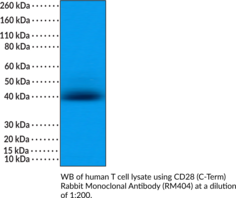Territorial Availability: Available through Bertin Technologies only in France
- Correlated keywords
- CD-28 80 CTLA4 B-7 a b c IL2 IFN? 28a 28b 28c PI3-K PI-3K RM-404 TP 44
- Product Overview:
CD28 is a glycoprotein and member of the CD28/B7 family of co-stimulatory receptors that promotes T cell activation.{52543} Alternative splicing of CD28 produces one full-length long isoform, CD28 long, and three short isoforms, CD28a, CD28b, and CD28c.{52544} CD28 long exists as a membrane-bound homodimer and contains a leader peptide, an extracellular immunoglobulin variable (IgV) domain that interacts with the co-stimulatory molecules CD80 (Item No. 32013) or CD86 and a cytoplasmic tail that mediates the association with the signal transduction enzyme PI3K and is critical for T cell activation.{52543,52545} CD28a, CD28b, and CD28c contain truncated extracellular or transmembrane domains and exist as soluble monomers (CD28a) or membrane-bound homodimers (CD28b and CD28c).{52544} CD28 is constitutively expressed on the surface of T cells, upregulated by antigen-presenting cells (APCs) displaying MHC-bound antigen, and downregulated after T cell activation.{52546,52547} CD28 competes with CTLA-4 (Item No. 32009), an inhibitor of T cell activation also expressed on T cells, for binding to CD80 or CD86, promoting T cell activation by inducing the production of cytokines, such as IL-2 and IFN-?, and decreasing the T cell receptor activation threshold.{52546} Genetic deletion of Cd28 abolishes cellular infiltration and bone erosion in the joints and decreases serum levels of anti-collagen-IgG in a mouse model of collagen-induced arthritis.{52548} CD28 levels are decreased on plasma cells isolated from patients with multiple myeloma and this decrease is associated with disease progression and poor prognosis.{52549} CD28 SNPs have been found in individuals with sporadic breast cancer.{52550} Cayman’s CD28 (C-Term) Rabbit Monoclonal Antibody can be used for immunohistochemistry (IHC) and Western blot (WB) applications.
Cayman Chemical’s mission is to help make research possible by supplying scientists worldwide with the basic research tools necessary for advancing human and animal health. Our utmost commitment to healthcare researchers is to offer the highest quality products with an affordable pricing policy.
Our scientists are experts in the synthesis, purification, and characterization of biochemicals ranging from small drug-like heterocycles to complex biolipids, fatty acids, and many others. We are also highly skilled in all aspects of assay and antibody development, protein expression, crystallization, and structure determination.
Over the past thirty years, Cayman developed a deep knowledge base in lipid biochemistry, including research involving the arachidonic acid cascade, inositol phosphates, and cannabinoids. This knowledge enabled the production of reagents of exceptional quality for cancer, oxidative injury, epigenetics, neuroscience, inflammation, metabolism, and many additional lines of research.
Our organic and analytical chemists specialize in the rapid development of manufacturing processes and analytical methods to carry out clinical and commercial GMP-API production. Pre-clinical drug discovery efforts are currently underway in the areas of bone restoration and repair, muscular dystrophy, oncology, and inflammation. A separate group of Ph.D.-level scientists are dedicated to offering Hit-to-Lead Discovery and Profiling Services for epigenetic targets. Our knowledgeable chemists can be contracted to perform complete sample analysis for analytes measured by the majority of our assays. We also offer a wide range of analytical services using LC-MS/MS, HPLC, GC, and many other techniques.
Accreditations
ISO/IEC 17025:2005
ISO Guide 34:2009
Cayman is a leader in the field of emerging drugs of abuse, providing high-purity Schedule I-V Controlled Substances to federally-licensed laboratories and qualified academic research institutions for forensic analyses. We are certified by ACLASS Accreditation Services with dual accreditation to ISO/IEC 17025:2005 and ISO Guide 34:2009.





